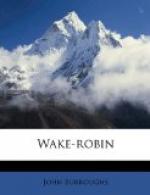When we lay down, there was apparently not a mosquito in the woods; but the “no-see-ems,” as Thoreau’s Indian aptly named the midges, soon found us out, and after the fire had gone down, annoyed us very much. My hands and wrists suddenly began to smart and itch in a most uncomfortable manner. My first thought was that they had been poisoned in some way. Then the smarting extended to my neck and face, even to my scalp, when I began to suspect what was the matter. So, wrapping myself up more thoroughly, and stowing my hands away as best I could, I tried to sleep, being some time behind my companions, who appeared not to mind the “no-see-ems.” I was further annoyed by some little irregularity on my side of the couch. The chambermaid had not beaten it up well. One huge lump refused to be mollified, and each attempt to adapt it up some natural hollow in my own body brought only a moment’s relief. But at last I got the better of this also and slept. Late in the night I woke up, just in time to hear a golden-crowned thrush sing in a tree near by. It sang as loud and cheerily as at midday, and I thought myself, after all, quite in luck. Birds occasionally sing at night, just as the cock crows. I have heard the hairbird, and the note of the kingbird; and the ruffed grouse frequently drums at night.
At the first faint signs of day a wood thrush sang, a few rods below us. Then after a little delay, as the gray light began to grow around, thrushes broke out in full song in all parts of the woods. I thought I had never before heard them sing so sweetly. Such a leisurely, golden chant!—it consoled us for all we had undergone. It was the first thing in order,—the worms were safe till after this morning chorus. I judged that the birds roosted but a few feet from the ground. In fact, a bird in all cases roosts where it builds, and the wood thrush occupies, as it were, the first story of the woods.
There is something singular about the distribution of the wood thrushes. At an earlier stage of my observations I should have been much surprised at finding them in these woods. Indeed, I had stated in print on two occasions that the wood thrush was not found in the higher lands of the Catskills, but that the hermit thrush and the veery, or Wilson’s thrush, were common. It turns out that the statement is only half true. The wood thrush is found also, but is much more rare and secluded in its habits than either of the others, being seen only during the breeding season on remote mountains, and then only on their eastern and southern slopes. I have never yet in this region found the bird spending the season in the near and familiar woods, which is directly contrary to observations I have made in other parts of the state. So different are the habits of birds in different localities.
As soon as it was fairly light we were up and ready to resume our march. A small bit of bread and butter and a swallow or two of whiskey was all we had for breakfast that morning. Our supply of each was very limited, and we were anxious to save a little of both, to relieve the diet of trout to which we looked forward.




